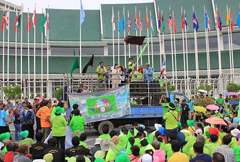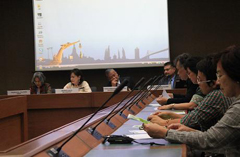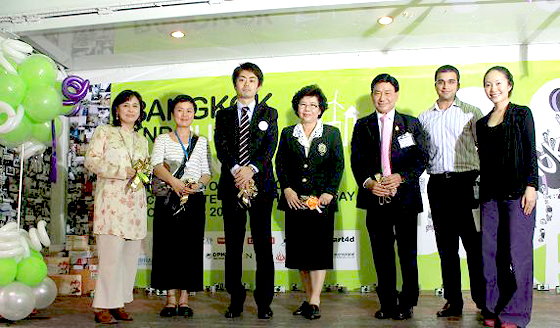The UN General Assembly designated the first Monday of October of every year as “World Habitat Day”. The idea is to reflect on the state of our towns and cities and the basic right of all, to adequate shelter. The theme “Cities and Climate Change” was chosen this year because climate change is fast becoming the preeminent development challenge of the 21st century.
In the morning of World Habitat Day, Four Regions Slum Network (FRSN) and Leaders and Organizers of Community Organization in Asia (LOCOA) were marching and stopped in front of the UN Building in Bangkok to submit petition to Secretary General of the United Nations on the problem of homelessness as well as the impact on urban poor communities stemming from climate change.
“Cities are centers of industrialization and sources of emission, but they are also home to solutions. More and more municipalities are harnessing wind, solar and geothermal energy, contributing to green growth and improving environmental protection” said UN Secretary-General Ban Ki-moon in a message read out on his behalf. He reminded that both developed and developing countries had committed to reduced greenhouse gas emissions in a formal, accountable international agreement.
In a statement read out on his behalf, UN-HABITAT Executive Director Dr. Joan Clos, said: "It is estimated that by 2050, there could be as many as 200 million environmental refugees worldwide, many of whom will be forced from their homes by rising sea levels and the increased frequency of flooding or drought. Prevention should be addressed through better urban planning and building codes so that city residents, especially the poorest, are protected as far as possible against disaster," he said. "Such measures can also help to keep their ecological footprint to the minimum."
 FRSN and LOCOA submitting petition and UN Officials statements reading
FRSN and LOCOA submitting petition and UN Officials statements readingFollowing the FRSN and LOCOA submitted petition, a Seminar was organized in the UN building on “What is climate change’s impact on our cities and what can we do?” jointly by UN-HABITAT, UNESCAP, UNDP, and Thailand Environment Institute (TEI). Seminar was serving as an opportunity to share the ideas, experiences, practices, knowledge and innovations in mainstreaming climate change mitigation and adaptation in Thailand.
 Opening remarks were given by Dr Anuradha Rajivan of UNDP, Ms Mariko Sato of UN-HABITAT, Governor of Bangkok Mr. Sukhumbhand Paribatra and Mr Adnan Hameed Aliani of UN-ESCAP
Opening remarks were given by Dr Anuradha Rajivan of UNDP, Ms Mariko Sato of UN-HABITAT, Governor of Bangkok Mr. Sukhumbhand Paribatra and Mr Adnan Hameed Aliani of UN-ESCAPMs Mariko Sato, Chief of the UN-HABITAT Bangkok Office in her opening remark congratulated the Chiang Rai Municipality for being chosen by the Habitat Scroll of Honour award committee as one of the three Best Practices from the World for its holistic approach to harnessing biodiversity, developing the project known as the "Urban Biodiversity in Chiang Rai Municipality towards Sustainable City and Climate Resilience".
Mr Adnan Hameed Aliani, Chief of the Sustainable Urban Development Section of UN-ESCAP stated that: “The challenges facing us are enormous, but then so are the opportunities. We must harness these opportunities and build partnership between national and local governments, academic and research institutions, the private sector and the civil society organizations, including the organizations of the poor to address the challenges facing our cities, because doing nothing would be catastrophic.”
Dr. Anuradha Rajivan, Team Leader for the forthcoming UNDP Asia-Pacific Human Development Report on Climate Change emphasized the duel role climate change action in cities can have, by reducing green house gases while at the same time focusing efforts to reduce human vulnerability, especially for the urban poor "Cities are home to large numbers of vulnerable people. Our region's cities now have an opportunity to alter the course of urban development. They should be able to by capitalizing on the latest technologies, improving their systems for governance and finance and working cooperatively to move in lower carbon and greener directions."
Governor of Bangkok Mr. Sukhumbhand Paribatra opened the Seminar highlighting the importance of collaboration among different actors in taking action to reduce the impact of climate change in Bangkok and other Thai cities. During the round-table discussion on impact of climate change and adaptation in Thai cities, especially flooding protection and management, gave valuable thoughts from various stakeholders. It is said that all problems are needed to be solved with public participation, although potential conflicts might arise. To avoid the conflict, public participation should be promoted at the early stage of the processed and programmes. Moreover, cooperation and integration among organizations is required as the impact and causes are not limited only within city boundary.
After the Seminar, Mobile Photo Exhibition was opened, organized by Design for Disasters (D4D’s), UN-HABITAT and BMA with support provided from UN-ESCAP, UNDP, Lomography, Isuzu, Thai Transportation and Logistics Association, Bangkok Art and Culture Center, art4d, Thai Urban Designers Association, Asian Institute of Technology, Disaster Preparedness Mitigation and Management, KUN: Kunakij Furniture Industry, Mono Project, Lookyung Foundation, Supernormal and Ductstore. The public captured Bangkok in photos telling stories about Life, Place, Time and the Surrounding that contribute to the climate change, which in turn, be affected by the phenomenon. Selected photos are on display at Mobile Photo Exhibition on Isuzu van from 3 – 9 October moving around Bangkok visiting 8 locations including slum settlements.

Representatives of UN agencies with supporting partners at the opening of the Mobile Photo Exhibition







